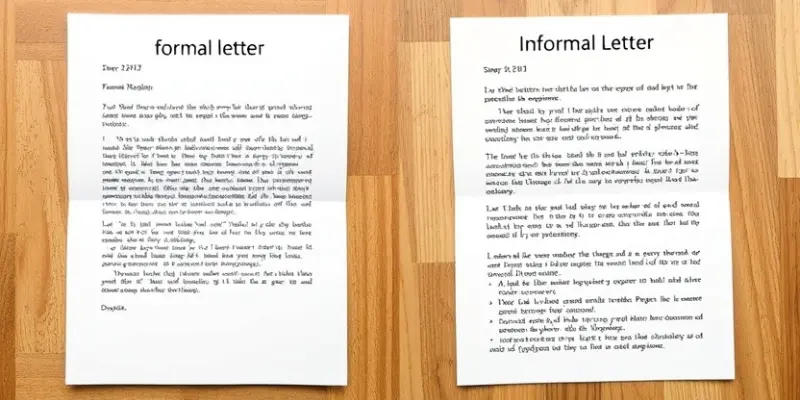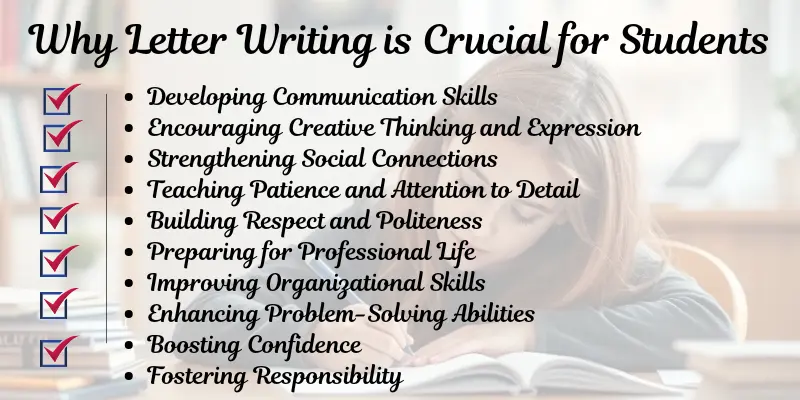Why Letter Writing is Important for Students: Key Benefits and Skills
Published: 19 Nov 2024
Ali’s situation is a lot like trying to build a strong friendship. Imagine you meet someone for the first time and instantly send them a quick message, but you want to make that connection meaningful. Instead of sending a text, you take the time to write a thoughtful letter one that shows you care and values the person. That’s exactly what letter writing does for communication. It turns a simple message into a lasting impression.
As the famous author, C.S. Lewis, once said,
“We read to know we are not alone.”C.S. Lewis
Letter writing allows us to connect on a deeper level, much like reading a book that speaks to your soul. Just like reading helps us relate to others’ experiences, writing a letter connects us with the recipient’s emotions and thoughts in a more personal and lasting way.
In this article, you’ll learn why letter writing is important for students and how it can improve your communication skills, boost creativity, and help you express your emotions clearly.
We’ll explore its benefits, including its role in academic growth, developing writing skills, and maintaining personal connections in today’s digital world.
Start practicing letter writing today and see how it can make you a better communicator and writer!
Let’s begin!
1. What is Letter Writing?

Letter writing is the art of expressing thoughts, feelings, or information through written words. It has been a primary means of communication for centuries and remains an essential skill, even in today’s digital age. Letter writing allows individuals to convey personal messages or official communication in a thoughtful and meaningful way.
Difference Between Formal and Informal Letters
When it comes to letter writing, there are two main types: formal letters and informal letters. The difference between them lies mainly in their purpose, tone, and structure. If you want to learn more, you can explore in detail about What is a Formal Letter? and What is an Informal Letter?.
Formal Letters:
- These letters are used in professional or official communication, such as writing to a company, school, or government institution.
They follow a specific structure and tone that is polite and respectful.

Informal Letters:
- These letters are more personal and are written to friends, family, or acquaintances. The tone is casual, and the structure is more flexible compared to formal letters.
How Letter Writing Enhances Communication Skills
Engaging in letter writing improves both verbal and written communication skills. It forces you to think carefully about how to express your ideas clearly and concisely. Whether you are writing a formal letter for a job application or an informal letter to a friend, the practice of structuring your thoughts in writing helps you become a more articulate communicator.
2. Why Letter Writing is Crucial for Students
we will explore the reasons why letter writing is essential for students and how it plays a key role in their personal and academic growth. It’s not just about learning to write; it’s about developing vital skills that will help them in every area of life.
Here’s a quick overview of the 10 crucial reasons:
Quick Overview:
- Developing Communication Skills
- Encouraging Creative Thinking and Expression
- Strengthening Social Connections
- Teaching Patience and Attention to Detail
- Building Respect and Politeness
- Preparing for Professional Life
- Improving Organizational Skills
- Enhancing Problem-Solving Abilities
- Boosting Confidence
- Fostering Responsibility
- Developing Communication Skills
Letter writing significantly enhances communication skills by encouraging students to think critically and express their ideas clearly. Whether it’s a formal letter for school or a personal letter to a friend, students learn how to structure their thoughts and convey messages in an effective way. This practice helps them communicate better in both written and verbal forms. - Encouraging Creative Thinking and Expression
Writing letters also helps students develop their creativity. By writing to others, students can express their thoughts and emotions in a way that suits the context of the letter. They also learn how to explore different writing styles, from formal to informal, which enhances their creative thinking. This self-expression helps students in exploring their own thoughts and articulating them effectively. - Strengthening Social Connections
In today’s digital world, letter writing still holds a special place in fostering deep, personal relationships. Writing to friends, family, or even pen pals encourages students to stay connected and build long-lasting bonds. Through letter writing, they develop emotional intelligence and empathy, understanding the value of thoughtful communication over quick messages. - Teaching Patience and Attention to Detail
Unlike emails or texts, which can be sent quickly, writing a letter requires more thought and patience. Students must carefully plan what to write, choose their words thoughtfully, and pay attention to the format and structure of the letter. This process helps them develop attention to detail and learn the value of patience, as writing a letter requires more time and effort. - Building Respect and Politeness
Letter writing teaches students the importance of using polite language and showing respect. Whether they are writing to a teacher, a friend, or a family member, students learn how to be respectful in their tone and language. These are key traits that will help them succeed in both personal and professional environments. - Preparing for Professional Life
Letter writing prepares students for the professional world by helping them understand the structure and formalities of business communication. Writing letters for job applications, inquiries, or complaints teaches them how to write formally and use the correct tone in professional settings. These skills will be invaluable in their future careers. - Improving Organizational Skills
Writing letters helps students organize their thoughts and information. They learn how to present their ideas in a clear and structured manner, making their communication more effective. Organizing their ideas in a letter format helps students with other forms of writing, such as essays or reports, as well. - Enhancing Problem-Solving Abilities
When writing letters, especially for academic or professional purposes, students often need to think critically to express their thoughts clearly and logically. This enhances their problem-solving skills as they work through the process of organizing their points and presenting solutions in a clear and understandable way. - Boosting Confidence
Writing letters helps students gain confidence in their ability to communicate. As they practice writing and see the positive impact of their letters, whether in personal relationships or academic achievements, they gain self-assurance in their writing skills. This confidence also translates into other areas of their academic and personal life. - Fostering Responsibility
When students engage in letter writing, they take responsibility for their communication. Whether it’s a formal letter or a thank you note, students learn the importance of timely responses and the responsibility they have to convey their messages appropriately. This helps them develop a strong sense of accountability in their personal and academic lives.

3. Uses of Letter Writing in Students’ Life
Letter writing is a powerful tool that helps students in various areas of their life. From academics to personal growth, it plays a crucial role.
Let’s explore some of the key ways letter writing is used in students’ lives:
Academic Uses
- Improves Writing Skills: Writing letters helps students enhance grammar and sentence structure, which aids in academic writing.
- Boosts Critical Thinking: Letter writing encourages logical thinking and clear communication, which is beneficial for academic tasks.
- Effective Communication: Writing letters improves overall communication skills, helping students in essays, assignments, and projects.
Personal Uses
- Strengthens Relationships: Personal letters help students stay connected with friends and family, fostering stronger relationships.
- Expresses Gratitude: Writing thank-you notes teaches the importance of appreciating others.
- Emotional Outlet: Letters provide a way to express feelings and thoughts, promoting emotional intelligence.
Social Uses
- Builds Social Connections: Letter writing helps students maintain and grow friendships, even with long-distance peers.
- Cultural Exchange: Writing letters to pen pals introduces students to new cultures and perspectives.
- Encourages Thoughtful Communication: Letters promote deeper, more meaningful conversations compared to quick digital messages.
4. Advantages of Letter Writing for Students
Letter writing is a valuable skill that provides numerous benefits for students. It helps them grow in many areas of life, both personally and academically.
Let’s explore some of the key advantages:
| Advantages of Letter Writing for Students |
|---|
|
5. Disadvantages of Letter Writing for Students
While letter writing has many benefits, it does come with its challenges.
Here are some disadvantages of letter writing for students:
| Disadvantages of Letter Writing for Students |
|---|
|
6. Letter Writing in a Digital World
In today’s digital age, communication has become faster and more convenient with emails, texts, and social media. However, letter writing still holds a special place, and it’s important to maintain this tradition, even in the era of technology.
Technology and Letter Writing
- Faster Communication: Digital communication allows for quick exchanges, but it often lacks the personal touch that letters provide.
- Digital Overload: With constant notifications and instant messages, people are losing the art of thoughtful, detailed communication that letter writing promotes.
- Learning from Technology: While technology has changed how we communicate, it’s important to balance both digital and traditional methods to maintain strong communication skills.
Maintaining the Tradition of Letter Writing
- Personal Connection: Writing a letter gives a personal touch that emails or texts often miss. It allows for more emotional expression and deeper connections.
- Building Patience: Unlike instant messaging, letter writing requires time and effort, teaching students patience and thoughtfulness in communication.
- Creating Memories: Letters can be saved and cherished for years, offering a tangible way to remember important moments.
Frequently Asked Questions about Letter Writing for Students
Letter writing holds significant value in a student’s life. It not only enhances communication skills but also nurtures emotional intelligence, patience, and creativity.
Below are some of the most commonly asked questions related to the topic, which will help you understand the importance of letter writing even better.
What is letter writing?
Letter writing is the process of composing a written message, typically on paper or in digital form, to convey thoughts, information, or feelings to someone. It can be formal or informal, depending on the relationship with the recipient.
Why is letter writing important for students?
Letter writing helps students improve their communication skills, both in writing and in expressing themselves. It also enhances creativity, patience, and thoughtfulness, skills that are valuable in both personal and academic life.
How does letter writing improve communication skills?
Writing letters requires careful thought and clarity, which helps students organize their ideas and express them effectively. This improves overall communication abilities and writing fluency.
What are the benefits of writing formal letters for students?
Writing formal letters helps students practice professional communication, which is useful for job applications, requesting information, or addressing official matters.
Can letter writing help build emotional intelligence?
Yes, letter writing encourages students to express their emotions clearly, fostering emotional intelligence. It helps them articulate feelings and show empathy for others.
What is the difference between formal and informal letters?
Formal letters are used for professional or official communication, while informal letters are more personal and are usually written to friends or family.
How does letter writing strengthen social connections?
By writing letters, students can build stronger relationships with others, whether it’s sending thank you notes, expressing gratitude, or simply staying in touch with friends and family.
Is letter writing still relevant in today’s digital age?
Although digital communication has become more prevalent, letter writing still holds value as it allows for a more personal, thoughtful expression of ideas.
What are some common mistakes students make when writing letters?
Common mistakes include poor organization of ideas, using incorrect tone, or failing to proofread the letter before sending it. It’s important to be clear, respectful, and organized.
How can letter writing prepare students for professional life?
Letter writing helps students practice formal communication and attention to detail, skills that are important in any career. It teaches professionalism, respect, and how to communicate effectively.
Conclusion
In this article, we’ve explored the many reasons why letter writing is important for students. From improving communication skills to fostering strong relationships, the benefits are clear. Letter writing is not just a skill, but a way to enhance personal and academic growth. Let’s quickly review the key points:
- Enhances Writing Skills: Letter writing helps students become better writers, which benefits them in school and beyond.
- Boosts Critical Thinking: It encourages students to think logically and express ideas clearly.
- Strengthens Relationships: Through personal letters, students stay connected with friends, family, and even build new friendships.
- Promotes Gratitude and Self-Expression: Writing letters teaches students to be thankful and helps them express emotions in a thoughtful way.
If you want to improve your communication skills, strengthen your relationships, and build a more thoughtful mindset, start practicing letter writing today. Whether it’s for school, personal use, or social reasons, writing letters can make a big difference in your life. Take action now! Try writing a letter to a friend, family member, or simply to express your thoughts. Share your letter in the comment section below, and feel free to ask any questions. Don’t hesitate to reach out – we’re here to help!
Let’s start writing!

- Be Respectful
- Stay Relevant
- Stay Positive
- True Feedback
- Encourage Discussion
- Avoid Spamming
- No Fake News
- Don't Copy-Paste
- No Personal Attacks

- Be Respectful
- Stay Relevant
- Stay Positive
- True Feedback
- Encourage Discussion
- Avoid Spamming
- No Fake News
- Don't Copy-Paste
- No Personal Attacks








